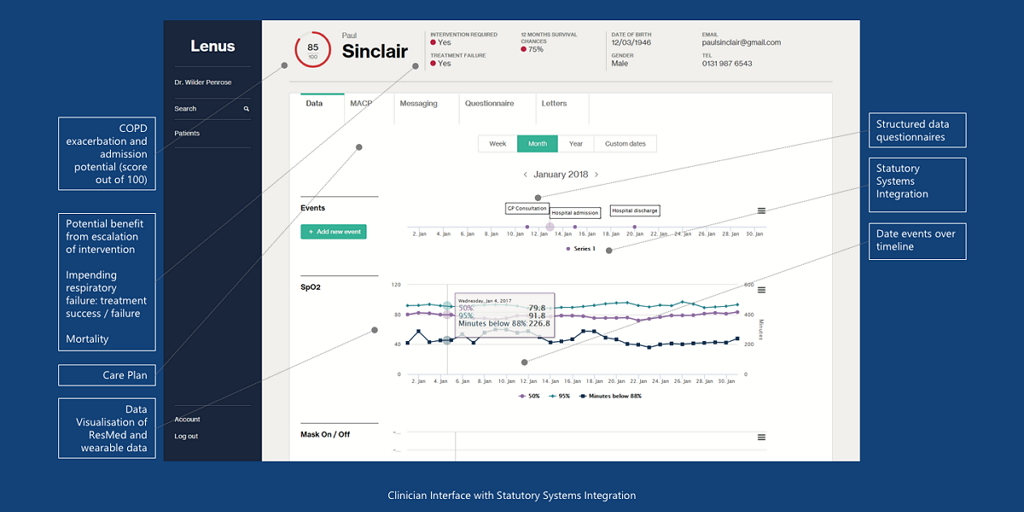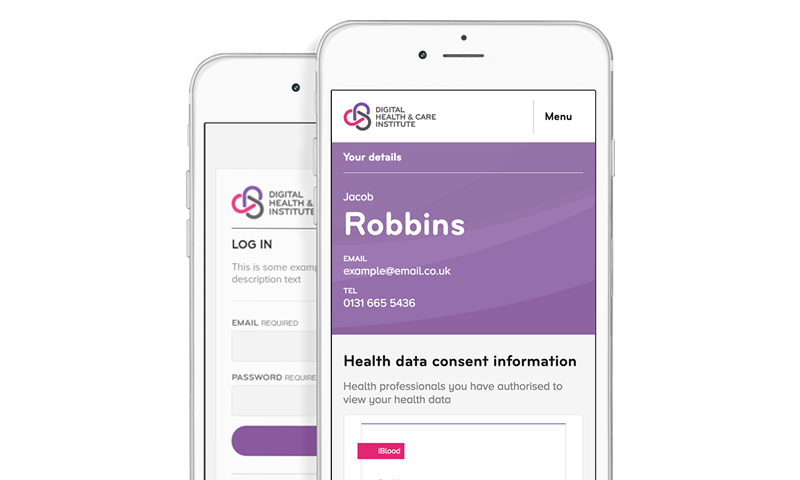Storm ID, NHS Greater Glasgow & Clyde and KenSci combat COPD
UK’s innovation agency, Innovate UK, awarded co-funding of £750,000 to develop a new care pathway for patients with Chronic Obstructive Pulmonary Disease (COPD).
With 1.2 million people affected by COPD in the UK, predictive capabilities could deliver savings
Storm ID, NHS Greater Glasgow & Clyde and Seattle based risk prediction platform KenSci have been awarded co-funding of £750,000 by the UK’s innovation agency, Innovate UK, to develop a new care pathway for patients with Chronic Obstructive Pulmonary Disease (COPD).
With COPD affecting 1.2 million people in the UK, exacerbations of COPD are the second most common cause of emergency hospital admissions and account for one in eight of all UK hospital admissions. WHO (World Health Organisation) forecasts COPD to become the third leading cause of death worldwide by 2030.
The project seeks to reduce emergency hospital admissions among the highest risk COPD patients through remote monitoring and AI-enabled preventative interventions.
By remotely monitoring patients’ COPD symptoms, physiology and treatment in the home, machine learning algorithms will offer healthcare professionals clinical decision support to target patients at high risk of an exacerbation. The project aims to deliver a continuous and preventive digital health and care service.
With a target of reducing one emergency hospital admission per year for each patient using the service the potential cost savings to the NHS across the UK, if the service is successfully scaled across 20% of the highest risk COPD patients, equates to £1.4bn.
The project will build on existing workstreams underway including;
- Collaboration between Storm ID, Digital Health Institute and NHS Greater Glasgow & Clyde to develop new care pathways for a range of long-term conditions
- A home remote-monitored non-invasive ventilation (NIV) pilot for COPD patients by NHS Greater Glasgow & Clyde and ResMed that has already demonstrated benefits including reduction in hospital
- A Small Business Research Initiative (SBRI) funded project between KenSci and NHS Greater Glasgow & Clyde to develop a decision support algorithm for use in Emergency Departments to improve COPD care planning.
The project aligns closely with the ambitions set out in the recently published Scottish Government Digital Health and Care Strategy by supporting the shift of care into the community, reducing re-admission rates and empowering citizens to effectively manage their own care.

We look forward to collaborating with our partners on this exciting project. The development of a new service model for COPD that exploits patient-generated health data and machine learning models, in one of Europe’s largest health systems, will provide clear evidence of the value of the operationalising new preventative digital health services. We hope the open APIs, delivered as part of this project, that enable consent driven exchange of patient-generated data with electronic health records will act as a catalyst for other digital health innovators in future.
Paul McGinness, Director at Storm ID
We’re excited by the opportunity to deliver our vision for a digital infrastructure and service innovations which will enable early detection of potential COPD deteriorations in our highest risk patients. AI-guided predictive modelling and cloud-based decision support patient and clinician dashboards in this “DYNAMIC” study will enable focused patient-clinician communication, target clinical team’s resources, and facilitate early activation of self-management and tiered COPD treatment interventions. We know these COPD interventions provided individually reduce hospital admissions, improve quality of life and are cost-effective, but the challenge is to realistically deliver them in combination to patients who need them most, before an acute crisis and emergency hospital admission.
Chris Carlin, Consultant Respiratory Physician at NHS Greater Glasgow & Clyde
This unique collaboration will enable impactful digital health transformation for patients with debilitating lung disease. Data-driven reorientation of health care delivery across the continuum of disease both in the community and hospital will reduce hospital admissions while improving quality of life for these patients. Emergency Department attendance is the nadir of these patient’s long-term condition but with enhanced monitoring and analytics the team will be able to intervene days before the ambulance is called. Early warning of deterioration will enable our respiratory team to deliver the care they would receive in the ED at home improving patient outcomes whilst reducing demand on our overstretched Emergency Departments. We are excited to deliver this project to our patients as an exemplar of service model redesign which can optimise care for patients suffering chronic disease.
David Lowe, Emergency Consultant at NHS Greater Glasgow & Clyde
This is a fantastic opportunity to progress the digital transformation agenda in Scotland. The new Scottish Digital Health & Care Strategy makes it clear that citizens should be empowered to manage their own wellbeing and to live independently, and that this should be delivered using new, open platform approaches. This project embodies that vision and we look forward to seeing it move forward.
George Crooks, CEO at the DHI
This is an extraordinary opportunity for us to come together to make a meaningful difference to the life of millions of COPD patients and their families. NHS Scotland’s vision to preemptively identify patients and help them navigate a chronic illness with better use of technology is both inspiring and a framework for how healthcare should be – preemptive and connected. We are honored to partner with Microsoft, ResMed and StormID to bring the best of cloud, devices and machine learning in the service of the millions under care of NHS Scotland.
Samir Manjure, Co-founder & CEO, KenSci

About:
Storm ID is a digital transformation consultancy with a 17-year track record of delivery in health care and the wider public sector. It developed the Lenus Digital Health and Care Platform, an open vendor agnostic platform, to support new models of care that combine remote monitoring of patients with machine assisted decision support. The Digital Health and Care Institute (DHI) uses the platform to provide a test bed for developers to connect new and existing digital health services with health professionals across NHS Boards in Scotland. Developers can sign up to the DHI Developer Portal to connect and build new services.
NHS Greater Glasgow & Clyde is the largest health board in the UK, providing healthcare to over 1.2 million people. It has a strong track record in innovation and research, hosting the largest SafeHaven repository of anonymised electronic health data. The importance of digital health innovation is recognised in core initiatives proposed in its ‘Moving Forward Together’ strategy blueprint for the future of health and social care services.
KenSci is the world’s first vertically integrated machine learning platform for healthcare, making it more proactive, coordinated and accountable, fast. KenSci’s platform is engineered to ingest, transform and integrate healthcare data across clinical, claims, and patient-generated sources. A library of prebuilt models and modular solutions for clinical, financial and operational risk prediction enable customers to ask and answer harder questions faster
Innovate UK drives productivity and economic growth by supporting businesses to develop and realise the potential of new ideas. We connect businesses to the partners, customers and investors that can help them turn ideas into commercially successful products and services and business growth. Innovate UK is part of US Research and Innovation.